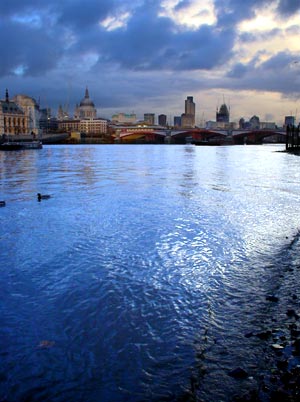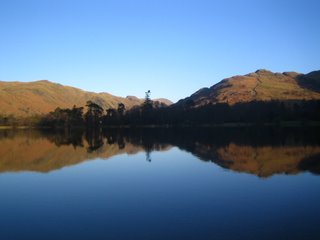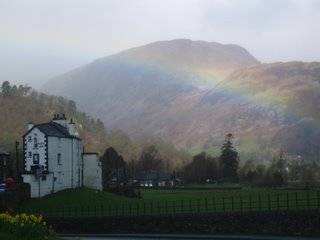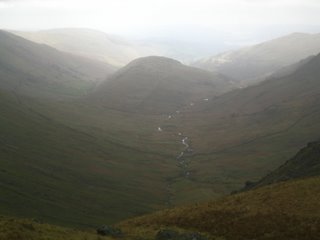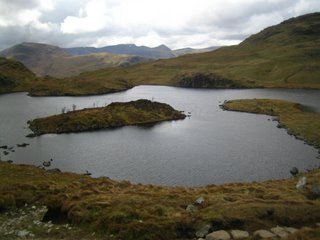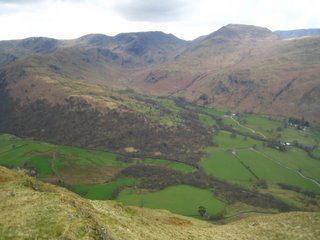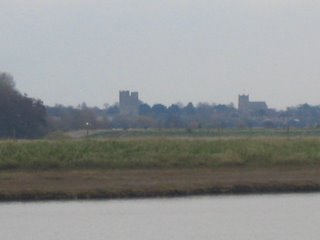BREATHING STONES (a short story)Sam and his family sat with supper on their laps. It was Sunday evening and, as usual, they sat watching BBC television. Mr and Mrs Parkes were an excitable couple who bounced and strutted through life as if on springs. Their eldest daughter Mary, 15, was lively too, though her zest for life was tempered by erratic hormones and a voice that was half an octave too deep. Sam, 10, was the youngest of the children, and also the quietest. He was bookish and somewhat precocious and had already learned the Periodic Table up to Iridium. Under duress, he nibbled his way through a cox’s orange pippin and gnawed inhumanly at the core while he watched the local news. A reporter stood on Trafalgar Square in front of a column with no statue at the north-western corner, reading a Mayoral press release from the autocue.
“The Mayor today announced that the decision of who should join George IV, Havelock, Napier and Nelson as the permanent residents of London’s most famous square will be decided by the public. The winner will have their name inscribed on the commemorative plaque alongside that of their hero or heroine. BBC London viewers can vote by going to our website at…” – and the reporter gave out the details.
The Parkes looked at each other. Sam picked at the tight skin of a clementine.
“They once suggested Christ,” said Sam’s father.
“But people said it was too religious,” said his sister.
“You can’t get much more religious than Christ,” said Sam’s father thoughtfully, which was true.
“I bet they’ll get some wacky suggestions!” said Mrs Parkes, to which Mary emitted a snort.
“Yuh – like, I don’t know, pop stars” – she spat out the words – “or supermodels.” Mr Parkes thought about saying something mannish about supermodels, something that might impress his boy, but he couldn’t think of anything. He smoothed his moustache with his forefinger.
“What do you think Sam?” The family looked at him as though he might be the source of some eternal truth. After a grave pause, he said “I don’t know” and left the room.

Sam stayed up most of the night, and sat on the edge of his bed with the lights off. He could hear Mary in her bedroom next-door talking to herself. She imagined she was in a hospital bed recovering from a car accident and surrounded by friends. She asked herself how it had all happened and replied to her own question in detail. “I thought I was going to die,” she said, over and over. “I’m to stay in bed and the doctor will look after me.” Sam spent a couple of hours leaning on his window-sill, the curtain drawn over his head. It was pitch black and he looked down the garden, wondering who or what might be down there at three o’clock in the morning. When it began to get a little light, shortly before dawn, Sam drifted off to sleep.
Sam had circled the closing date for the competition on his calendar. He spent all his spare time in the following two weeks designing his north-western statue, writing elegant prose about his chosen subject, even going down to Trafalgar Square one Saturday afternoon while he parents shopped to get a sense of size and scale. He had planned that his statue would be proportionally one eighth taller and one tenth broader than George IV, Havelock and Napier. Nelson, who was seventeen feet tall and only stood taller by virtue of a one hundred and seventy foot column, Sam viewed with utter disdain. Right up until two days before the closing date Sam was perfecting his design, adding then removing a pair of winged boots from his subject’s feet, changing a modern haircut to classical curls, and changing the line of sight from Westminster Bridge to St. Paul’s; finally, with nine hours to go, Sam scrapped his previous drafts and started anew, submitting his final master copy to the BBC with ninety minutes to spare. The Parkes left him mainly to his own devices, interrupting only to make helpful suggestions and offer cox’s orange pippins or plates of mash. Sam responded by learning the Periodic Table up to the Lanthanides and by being unpleasant until the day when the Mayor of London announced that the winner of the Trafalgar Square competition was Sam Parkes, 10.
On the day of the unveiling, the Parkes family stood proudly on St Martin’s Place. In the weeks since the announcement of Sam’s triumph, the story had provoked some considerable debate. Newspapers wanted a piece of ten year old Sam Parkes, and they asked him what he liked doing, what his favourite colour was, whether he had a girlfriend, where he took her for dinner, and – in one instance – who his artistic influences were (he mumbled something about Earle and Adams because he had read about them in a book).

He had got the dimensions all wrong. He had planned to be twelve feet tall and three feet broad, but in fact he was only four feet eleven by eighteen inches. Still, he stood calmly on his plinth and looked down at the crowds who had gathered to look at him. Workmen in bright orange coats scurried around beneath him carrying various stonemasonry tools. A precise man in a waistcoat chipped away at a plaque, etching “SAMUEL PARKS” in a medium sized Times Roman font, along with Sam’s date of birth and a brief biography. A kind quiet man called up to Sam.
“You ready to be installed?”

It was the kind of clean winter’s day when smoke rises directly upwards from chimneys and light and damp hang suspended in the air. A bright sun shone down on Sam. The crowd below had turned quiet and they waited for Sam to become public property.
The kind man raised a massive iron mallet up over his head and brought it crashing down on to Sam’s right foot, driving a large steel nail through his metatarsals to the stone below. His view of London paused, motionless, as if the shutter of a camera had clicked over it. Sam felt a jet of pain sail upwards, like a missile cruising through water, slowly and inexorably. As it flowed through his bloodstream, past knees, groin, stomach and chest, London shrunk to the size of a postage stamp, framed by a dense black frame. Sam heard cheers from young boys his own age and from patriotic older women and from his own mother and father. And as the pain reached his forehead and London was a small pinprick in his head, everything stopped. Everything was quiet. Sam tried to move and couldn’t. The kind, quiet man smashed another nail into Sam’s other foot, less cleanly this time, causing bone to shatter. As another bolt of pain soared through Sam’s body, London grew bigger, louder, and faster so that within thirty seconds the crowds had packed up and gone home and the streets were empty. Sam looked down Whitehall. Beside Banqueting House he saw Field Marshall Montgomery who winked at him. A little further down, on Parliament Square, Churchill was having one of his days and looked gloomy and drunk. Lord Nelson had turned on his heel and looked at Sam reprovingly. Sam tried to turn on his heel but found he could only move his neck.
“Hello Samuel,” said Nelson in a friendly voice.
“Hello Nelson,” replied Sam. “Why can I only move my neck?”
“Don’t ask me, Samuel – you designed yourself. And it appears, you’re no Baily.” George IV, Havelock and Napier giggled.
“Well, what am I supposed to do?”
“Samuel. Whatever body movements you may or may not be able to perform, you are nonetheless rooted to your plinth. Even if you could touch your toes, or lick your elbow or some such, you would still be stuck here. And don’t be won over by the celebrity this has brought you. You will soon be forgotten. The other three have.” George IV, Havelock and Napier grunted in agreement.
“So what do you do?”
“I preside, Samuel; preside over my square. It’s thanks to me that this little patch of concrete is not, as you might say, en France. And Monty and Churchill do the same in Whitehall, as it is thanks to them that that quarter mile is not im Deutschland. But you have read your history books, Samuel, so none of this will be news to you.”
Sam had been thinking; he couldn’t feel his feet. He looked down Whitehall again. Monty was waving at him.
“Why does Field Marshall Montgomery keep winking and waving at me?”
“Because he’s a bad man, Samuel. A true hero, but a profoundly bad man. Heroism and evil are not infrequent bedfellows.”
“And what about Churchill? He’s swaying about dreadfully.”
“Samuel, my boy, there are some things in life from which a boy of your tender years should be shielded, and Mr Churchill’s intemperance is one of them. But Winston is a good man, Samuel, and we must love him.”
“Does he never fall off his perch?”
“You make him sound like a budgerigar.” Field Marshall Montgomery’s winking was
getting on Sam’s nerves and he remembered that, during his last minute alterations to the statue’s design, he had stated that he wanted to be able to see all of London at any one time. Sam wanted to see his family and he began to stretch his neck. Before very long, he had stretched his neck well above Nelson’s head. Continuing his ascent, he looked northwards towards Hampstead and saw a little house with a light on outside and every room illuminated. The stretch of his neck stopped its upwards course and turned with a right-angle towards his home.

Sam took the scenic route to Hampstead, floating over the ponds and the zoo and the canal in Regent’s Park before turning right to make his descent into the Parkes’s back garden where his head came to rest on the birdbath. He looked up to the bedrooms upstairs. All the lights were on. Sam guided his head up to the sill outside his own room. He looked inside. There was a map on the wall of the Kings and Queens of England since olden times when Alfred and his men, and other such tribes, took England, or parts of it, and reproduced and fought until the invasion of the French. There was a Periodic Table which went right up to Lawrencium and a map of the heavens. There was a boy asleep in the bed.
He moved on to his parents’ room. They were talking, but Sam couldn’t make out what they were talking about, or why they were even trying to talk at two in the morning, or why they couldn’t talk with the lights out. They weren’t even looking at each other. They were wasting electricity. Mr Parkes, keen on military men, was watched over by a thumbnail portrait of Field Marshall Montgomery who gawped at Sam with a silly smile.
Sam moved on to the final bedroom, his sister’s. She lay in a high-raised bed with a metal frame. Her foot kind of hung in the air, supported by a kind of winch, but then again it kind of lay flat on the bed. She wore a bandage round her head which covered a gash she had sustained in a car-crash. A gang of people sat round the bed wishing her well. The people all wore very nice clothes which all smelled freshly laundered and sweet. They all asked the same questions and Mary gave lengthy answers and none of them had faces, just blank spaces where eyes, nose and mouth should have been. Sam rested on the window-sill. There were photos of Mary on top of the wardrobe, framed photos, which revealed her winning a swimming gala. She wore a burgundy swimsuit which was either too big or too small. One of the imaginary friends had been staring at Sam for some time, and she approached the window, opened it and slapped Sam round the face causing his neck to recoil. He withdrew his neck and made the descent back across Regent’s Park and back down to his plinth to join his feet and legs.

There had been an incident. Havelock was being blamed. Napier was dead and George IV had fled to a nook in Soho. Nelson was on the warpath with a snivelling Monty in tow. Sam looked at his feet. The polite man was unfastening the nails. The men in orange jackets helped Sam down and began smashing away at him, splitting his head in two. The right side of his face watched his foot shatter while the left side was loaded into a truck facing away from the square. When the men had finished loading his body parts in the truck, they drove out of Trafalgar Square at high speed and careered down the Strand. Sam’s faces looked at up at the stars. He recognised some of them from a constellation map in his room. The three stars in a row were Orion’s belt. Orion was a hunter who was blinded but who recovered his sight by looking at the sun. Then he was killed by Diana, goddess of the moon, and turned into a constellation of stars. As chunks of Sam were tipped into the Thames, he tried to look at the sun but it was shining on the other side of the world and the moon had gone in behind a cloud. A chunk of his head had rolled downwards and he could see the night sky twinkling in the river. He looked in, yearning to drown amongst the stars. He felt the last piece of himself fall into the water and sink sadly down to the riverbed, and there he stayed for a week or two before swimming eastwards to the sea.
